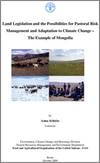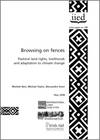This report combines a desktop survey and an in-depth study of Kenya’s legal framework and the extent to which it protects the country’s indigenous peoples. The report often takes reference to indigenous pastoralist groups in Kenya including the Endorois, Borana, Gabra, Maasai, Pokot, Samburu, Turkana and Somali.
Year of publication: 2009Organization: International Labour Organization (ILO)
Topic: Indigenous peoples
Language: English
Type of document: Technical, Scientific
Geographical coverage: Eastern Africa
In addressing the challenges facing mountain agricultural communities today, it is important to remember that mountain agriculture has developed hand in hand with pastoralism. Both large and small livestock sustain mountain communities, providing resources that complement those provided through agriculture. Pastoralism is not a strategy of last resort for agriculturalists pushed into marginal habitats. In fact, on the southern slopes of the Great Himalaya in Nepal, pastoralism has permitted agricultural communities to thrive and, in some cases, to extend their use of upper elevations into areas where agriculture is either marginal or impossible. A vertical look at lower, middle and upper altitude agropastoral practices provides insight into some different ways in which livestock management and cultivation interact within the larger context of mountain ecology.
Organization: Individual authors
Topic: Climate change, Economy, Indigenous peoples, Land, Resilience, Value addition
Language: English
Type of document: Technical
Geographical coverage: South Asia
This paper addresses the impacts of climate change in Mongolia asking what legal instruments can help to assure the adaptation of pastoralism - being the predominant economic activity and mode of life of the rural population - to the changing conditions. The analysis shows that securing the mobility of herders and their access to the relevant natural resources (pasture land, water, salt-licks) is a key feature for the adaptation to climate change and the corresponding risk management.
Year of publication: 2009Organization: Food and Agriculture Organization of the United Nations (FAO)
Topic: Climate change, Land, Resilience
Language: English
Type of document: Technical
Geographical coverage: Central Asia
A list with 10 misconceptions is presented and debated.
Year of publication: 2008Organization: International Union for Conservation of Nature (IUCN)
Topic: Economy, Environmental services, Land
Language: English, Français, Español
Type of document: Technical
Geographical coverage: Global
Pastoral women are extremely strong and powerful people. Despite the many challenges women face, they do find ways to ensure that the household’s basic needs are met; they do find ways to access resources and within the pastoral system, do have ‘rights’ to ownership and use of many of them; and they do find ways to get their voices heard. This report focuses on pastoralist women from pastoral communities across the world producing a global good practice study on pastoralist women’s empowerment.
Year of publication: 2008Organization: International Union for Conservation of Nature (IUCN)
Topic: Gender and youth
Language: English, Français, Español
Type of document: Technical
Geographical coverage: Global
This paper developed from an articulated process to address the rights to land of pastoral groups, within a holistic perspective and accounting for changes brought about by climate change. It presents a brief overview of pastoral systems, analyses the rationale behind mobility as a strategy to cope with scarce and variable resource endowment, and finally addresses the rights concerning the access to and the control of resources in the context of climate change. The historical and geographical dimensions of the debate are illustrated by examples from various pastoral areas in the world. Recommendations for appropriate policy options and development initiatives for pastoral areas considering the challenges of climate change are provided in the final section.
Year of publication: 2008Organization: International Institute for Environment and Development (IIED)
Topic: Climate change, Food security, Land, Resilience
Language: English
Type of document: Technical
Geographical coverage: Global
Climate change is having a destructive impact on many groups around the world. Pastoralists in East Africa have been adapting to climate variability for millennia and their adaptability ought to enable them to cope with this growing challenge. This paper explains the policies required to enable sustainable and productive pastoralist communities to cope with the impact of climate change and generate sustainable livelihoods.
Year of publication: 2008Organization: Oxfam
Topic: Climate change
Language: English
Type of document: Technical
Geographical coverage: Eastern Africa
This is one of a series of desk reviews produced as part of the project ‘Securing Pastoralism in East and West Africa: Protecting and Promoting Livestock Mobility’. It summaries the legislative and institutional environment governing livestock mobility East and West Africa, at the local, national, regional and continental levels, with a specific focus on nine countries (Chad, Ethiopia, Niger, Nigeria, Somaliland, Sudan, Burkina Faso, Mali and Mauritania).
Year of publication: 2008Organization: International Institute for Environment and Development (IIED), SOS Sahel
Topic: Organization
Language: English
Type of document: Technical
Geographical coverage: West Africa, Eastern Africa









